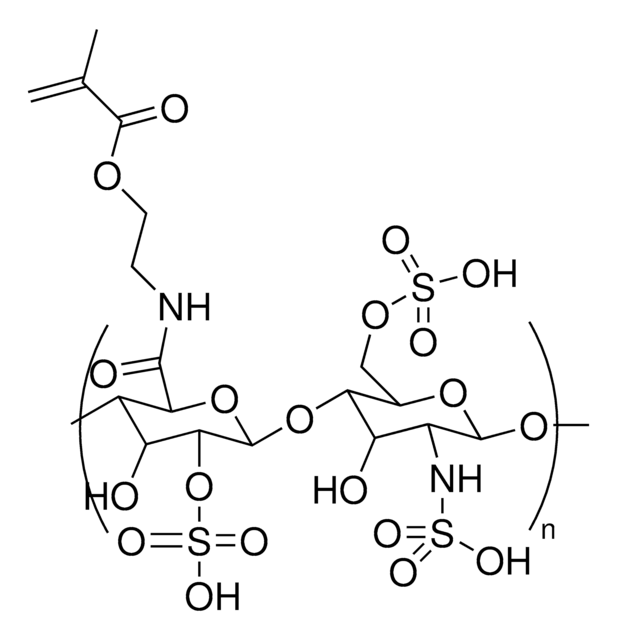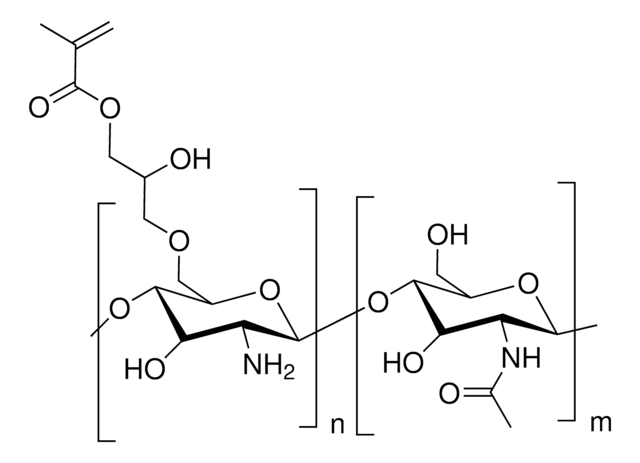925632
Poly(ethylene glycol)-block-Poly(2-methacryloyloxyethyl phosphorylcholine)
PEG average Mn 5000, PMPC Mn 21,000
Synonym(s):
PEG-b-PMPC, PEG-PMPC
Sign Into View Organizational & Contract Pricing
All Photos(1)
About This Item
Linear Formula:
CH3(C2H4O)nC6H7O2N(C11H22O6NP)
UNSPSC Code:
12352112
NACRES:
NA.23
Recommended Products
Related Categories
Application
PEG-b-PMPC is a biocompatible, non-fouling block copolymer composed of a neutral PEG block and a zwitterionic poly(2-methacryloyloxyethyl phosphorylcholine) (PMPC) block.
Poly (2-Methacryloyloxyethyl phosphorylcholine) (PMPC) is a methacrylate based polymer with a zwitterionic phosphorylcholine moiety on the side chain. The phosphorylcholine moiety is very similar to the head group of phospholipids in cell membranes. Due to this unique structure, PMPC showed excellent resistance to nonspecific protein adsorption, cell adhesion, and blood coagulation, as well as cell membrane penetration and underwater lubrication.
PMPC has been widely exploited in a diverse range of applications including
Poly (2-Methacryloyloxyethyl phosphorylcholine) (PMPC) is a methacrylate based polymer with a zwitterionic phosphorylcholine moiety on the side chain. The phosphorylcholine moiety is very similar to the head group of phospholipids in cell membranes. Due to this unique structure, PMPC showed excellent resistance to nonspecific protein adsorption, cell adhesion, and blood coagulation, as well as cell membrane penetration and underwater lubrication.
PMPC has been widely exploited in a diverse range of applications including
- antifouling materials for water treatment
- bioengineering
- nanomedicine
Storage Class Code
11 - Combustible Solids
WGK
WGK 3
Flash Point(F)
Not applicable
Flash Point(C)
Not applicable
Choose from one of the most recent versions:
Certificates of Analysis (COA)
Lot/Batch Number
Sorry, we don't have COAs for this product available online at this time.
If you need assistance, please contact Customer Support.
Already Own This Product?
Find documentation for the products that you have recently purchased in the Document Library.
An introduction to zwitterionic polymer behavior and applications in solution and at surfaces.
Blackman L D, et al.
Chemical Society Reviews, 48, 757-757 (2019)
Andrew Lewis et al.
Bioconjugate chemistry, 19(11), 2144-2155 (2008-11-01)
The water-soluble, biocompatible polymer poly(2-methacryloyloxyethyl phosphorylcholine) (PMPC) was evaluated for protein conjugation. PMPC is a zwitterionic polymer that is able to form a more compact conformation in aqueous solution than poly(ethylene glycol) (PEG). While a terminally functionalized N-hydroxysuccinimide derivative of
Critical update on 2-methacryloyloxyethyl phosphorylcholine (MPC) polymer science.
Goda T, et al.
Journal of Applied Polymer Science, 41766-41766 (2015)
Andrew Lewis et al.
Bioconjugate chemistry, 19(11), 2144-2155 (2008-11-01)
The water-soluble, biocompatible polymer poly(2-methacryloyloxyethyl phosphorylcholine) (PMPC) was evaluated for protein conjugation. PMPC is a zwitterionic polymer that is able to form a more compact conformation in aqueous solution than poly(ethylene glycol) (PEG). While a terminally functionalized N-hydroxysuccinimide derivative of
Our team of scientists has experience in all areas of research including Life Science, Material Science, Chemical Synthesis, Chromatography, Analytical and many others.
Contact Technical Service








